- Home
- Josephine Tey
The Singing Sands ag-6 Page 9
The Singing Sands ag-6 Read online
Page 9
They talked of the weather, the winter gales (which made today, according to Father Heslop, a thing of zephyrs), the penetrating damp, the occasionally idyllic summer days.
Why had a place of so few attractions captured the imagination of so many people, Grant wanted to know.
Well, partly it was that they saw it only at high summer, and partly it was that those who came and were disappointed, were reluctant to admit their disappointment either to themselves or the friends they had left behind. They compensated themselves by talking big. But it was Father Heslop’s own theory that most people who came were unconsciously running away from life, and they found what their imaginations prepared for them. Through their eyes the Islands were beautiful.
Grant thought this over, and then asked him if he had ever known a Charles Martin, who had been interested in singing sands.
No; Father Heslop had never met a Charles Martin, as far as he could remember. Had he come to Cladda?
Grant did not know.
He went out into the blast, and was blown back to the hotel at an undignified trot, teetering on his toes like an elderly toper. The bare lobby at the hotel smelled of unidentifiable hot food and sang like a choir as the wind came shrieking in under the outside door. But they had managed a fire that looked like a fire, in the sitting-room. To the scream of wind in the passage and the yowling of wind in the chimney he ate beef from South America, carrots tinned in Lincolnshire, potatoes grown in Moray, milk pudding packaged in North London, and fruit bottled in the Vale of Evesham. Now that he was no longer conditioned to magic, he filled his stomach thankfully with what was put in front of him. If Cladda had denied him spiritual joy it had provided him with a fine physical appetite.
‘Don’t you ever bake scones, Katie-Ann?’ he said, when he was arranging the time of his high tea.
‘Is it scones you’ll be wanting?’ she said surprised. ‘Indeed, yes, I’ll bake you some. But we have baker’s cakes for your tea. And biscuits, and ginger-snaps. Would you rather be having scones than them?’
Remembering the ‘baker’s cakes’ Grant said enthusiastically that he would, he would indeed.
‘Well, then,’ she said kindly, ‘of course, I’ll bake you a scone.’
For an hour he walked; along a flat grey road through a flat grey desolation. To his right, distant in the mist, was a hill; the only visible height. The whole thing was as inspiring as the fens on a wet January day. Every now and then the wind on his left flank would send him spinning sideways off the road altogether, and he struggled back half amused, half irritated. At long distances, odd cottages lay cowering close to the earth, blind and limpet-like, without any sign of human habitation. Some had stones slung from the roof by ropes to weight the structure against the wind’s importunity. None of them had fence, outhouse, garden or bush. It was living at its most primitive; inside four walls; everything under hatches and battened down.
And then, suddenly, the wind smelt salt.
And in less than half an hour he came on it. He came on it without warning, across a great waste of wet green grass that in summer-time must be starred with flowers. There had been no visible reason why the long levels of grassy land should not go on for ever to the horizon; it was all part of this flat grey endless world of bog. He had been prepared to go on walking to the horizon; so that he was startled to find that the horizon was ten miles out at sea. There it lay in front of him, the Atlantic; and if it was not beautiful it was, nevertheless, impressive in its sweep and simplicity. The dirty green water, dirty and ragged, roared on to the beach and broke in a flash of white that was vicious. To right and left, as far as eye could see, were the long lines of breaking water and the pale sands. There was nothing else in all the world but the green torn sea and the sands.
He stood there looking at it, and remembering that the nearest land was America. Not since he had stood in the North African desert had he known that uncanny feeling that is born of unlimited space. That feeling of human diminution.
So sudden had been the presence of the sea, and its rage and extent so overwhelming, that he had hung there motionless for several moments before realising that here were the sands that had brought him to the fringe of the western world in March. These were the singing sands.
Nothing sang today but the wind and the Atlantic. Together they made a Wagnerian tumult that buffeted one almost as physically as did the gale and the spray. The whole world was one mad uproar of grey-green and white and wild noise.
He walked down over the fine white sand to the edge of the water, and let the tumult roar over him. At close quarters it had a senseless quality that dissolved his uncomfortable sense of diminution and made him feel human and superior. He turned his back on it almost contemptuously as one would on a bad-mannered child who was making an exhibition of himself. He felt warm and alive and master of himself; admirably intelligent and gratifyingly sentient. He walked back up the sand, absurdly, and extravagantly glad to be a human being and alive. The air that came off the land when he had turned his back on the salt sterile wind from the sea was gentle and warm. It was like opening the door of a house. He went on across the grassy levels without once looking back. The wind hounded him along the flat bogs, but it was no longer in his face and the salt was no longer in his nostrils. His nostrils were full of the good smell of damp earth; the smell of growing things.
He was happy.
As he came at last down the slope to the harbour he looked up at the hill in the mist and decided that tomorrow he would climb it.
He came back to the hotel ravenous, and was gratified to be given no fewer than two items of local manufacture for his high tea. One was a plate of Katie-Ann’s scones, and the other was ‘sleeshacks’: a delicacy he had known of old. Sleeshacks were mashed potatoes fried in slices; and they certainly helped to make appetising the remains of cold beef from lunch which was the pièce de résistance of the meal. But as he ate his first course he kept smelling something more evocative of those early Strathspey days than even sleeshacks could be. An aroma both sharp and subtle it was, floating and circling about his brain in a nostalgic tantalisation. It was not until he had put his knife into one of Katie-Ann’s scones that he knew what it was. The scone was yellow with soda and quite uneatable. With a regretful salute to her for the memory (platefuls of yellow soda-laden scones laid out in the farmhouse kitchen table for the farm-hands’ tea: Oh, Tir nan Og!) he buried two of Katie-Ann’s scones under the glowing coals in the grate and made do with the Glasgow bread.
And that night he fell asleep without looking at the wallpaper and without remembering the closed window at all.
7
In the morning he ran into the Reverend Mr MacKay in the post-office and felt that he was distributing his favours very successfully. Mr MacKay was on his way down to the harbour to see if the crew of a Swedish fishing-boat that was lying there would like to come to church if they were still there the day after tomorrow. There was also, he understood, a Dutch vessel, that might be presumed to be of a Presbyterian persuasion. If they showed signs of wanting to come he would prepare a sermon in the English for them.
He condoled with Grant about the rough weather. It was early in the year for the Islands, but he supposed that one had to take holidays when one was given them.
‘You’ll be a schoolmaster, maybe, Mr Grant.’
No, Grant said, he was a Civil Servant. Which was his normal answer to questions about his profession. People were prepared to believe that Civil Servants were human beings; no one ever believed that a policeman was one. They were two-dimensional characters with silver buttons and a notebook.
‘You’d be amazed, now, you that has not been here before, if you could see what the Islands are like in June, Mr Grant. Not a cloud in the sky, day after day, and the air so hot that ye’ll see it dancing before you. And the mirage as mad as ever it was in the desert.’
‘Were you in North Africa?’
Och, yes; Mr MacKay had been in North Africa with the
Jocks. ‘And believe me, Mr Grant, I’ve seen odder things from my window up in the manse there than ever I did between Alamein and Tripoli. I’ve seen the lighthouse on the point there standing up in the air. Yes, halfway up the sky. I’ve seen the hill there change shape till it looked like a great mushroom. And as for the rocks by the sea, those great pillars of stone, they can turn light and transparent and move about as if they were walking through a set of the Lancers.’
Grant considered this with interest, and ceased to listen to the rest of Mr MacKay’s discourse. As he parted from him alongside the Ann Loefquist of Goteborg, Mr MacKay hoped that he was coming to the ceilidh tonight. All the island would be there and he would hear some fine singing.
When he asked his host about the ceilidh and where it was being held, Mr Todd said that it would be the usual mixture of song and talk and end up with the usual dance and that it would be held in the only place on the island suitable for such a gathering—the Peregrine Hall.
‘Why Peregrine?’
‘That is the name of the lady who gave it. She used to come to the island in the summer and she was all for improving trade and making the islanders self-supporting, so she built a fine long hut with big windows and skylights so that they could weave in company and not be ruining their eyes over looms in tiny dark rooms. They should get together, she said, and have a Cladda mark for their tweed and make it sought-after, like Harris. She could have saved her breath and her bawbees, poor lady. No islander would walk a yard to work. They would rather go blind than move out of their own light. But the hut is very useful for island gatherings. Why don’t you have a look in tonight when it gets going?’
Grant said that he would do that, and went away to spend the rest of the day climbing Cladda’s solitary hill. There was no mist today although the wind was still moisture-laden, and as he went upward the seas opened under him, scattered with islands and streaked with the tides. Here and there a single line, unnaturally straight in this arrangement of nature, marked the track of a ship. From the top he had the whole Hebridean world at his feet. He sat there and considered it, this barren water-logged universe, and it seemed to him the ultimate in desolation. A world half-emerged from chaos, formless and void. Looking down on Cladda itself it was impossible to tell, so mixed were sea and land, whether one was looking at a land full of lochs or a sea full of islands. It was a place best left to the grey geese and the seals.
He was happy up there, however; watching the changing patterns on the sea floor, violet and grey and green; watching the sea birds soar to inspect him and the flutter of nesting plovers on the low ground. Thinking about Mr MacKay’s mirages and the stones that walked. Thinking, as he never ceased for any length of time to think, about B Seven. Here was B Seven’s world, according to specification. The singing sands, the talking beasts, the walking stones, the streams that ceased to run. What had B Seven intended to do here? Just to come, as he himself had done, and look?
A flying dash, with an overnight case. That surely portended one of two things: a meeting, or an inspection. Since no one had yet missed him, then it could not have been a rendezvous. Therefore it was an inspection. One could go to inspect many things: a house; a prospect; a painting. But if one was driven to write verse en route then the verse was surely a pointer to the subject for inspection.
What had held B Seven in bondage to this bleak world? Had he been reading too many books by H. G. F. Pynche-Maxwell and his like? Had he forgotten that the silver sands and the wild flowers and the sapphire seas were strictly seasonal?
From the top of the hill at Cladda, Grant sent B Seven a salute and a blessing. But for B Seven he would not be sitting above this sodden world feeling like a king. New-born and self-owning. He was something more than B Seven’s champion now: he was his debtor. His servant.
As he left the shelter he had found for himself the wind caught him in the chest, and he leaned on it as he went downhill as he used to when he was a boy, so that it supported him and he could almost fall downhill in the most surprising manner and still be safe.
‘How long do gales usually last in this part of the world?’ he asked his host as they staggered through the darkness after supper towards the ceilidh.
‘Three days is the minimum,’ Mr Todd said, ‘but that doesn’t happen often. Last winter it blew for a month on end. You got so used to the roar of it that if it died away for a moment you thought you’d gone deaf. You’d be better to fly back, when you go, than cross the Minch in this weather. Most people fly nowadays, even the old people who’ve never seen a train. They take aeroplanes for granted.’
It occurred to Grant that he might indeed fly back. That if he waited another few days, if he had a little longer to grow accustomed to his new-found well-being, he might use the air journey as a test. It would be a pretty severe test; the severest he could subject himself to. To any claustrophobic the prospect of being boxed into a small space and hung helplessly in the air was sheer horror. If he faced it without wincing, and accomplished it without disaster, then he could pronounce himself cured. He would be a man again.
But he would wait a little; it was too early yet to ask himself the question.
The ceilidh had been in progress for some twenty minutes when they arrived, and they stood with the rest of the male population at the back. Only the women and the ancients occupied the chairs in the hall. Except for a row of male heads in the very front, where the Importances of the island sat (Duncan Tavish, the merchant, who was uncrowned king of Cladda, the two Churches, and some lesser lights), the male population lined the walls at the back and clustered round the entrance. It was an abnormally cosmopolitan gathering, Grant noticed, as the outsiders made way for them; both the Swedes and the Hollanders had come in force, and there were accents that belonged to the Aberdeenshire coast.
A girl was singing in a thin soprano. Her voice was sweet and true but without expression. It was like someone trying over an air on a flute. She was succeeded by a self-confident youngish man who received an ovation, on which he plumed himself so obviously that it was funny; one waited for him to bill his breast feathers like a bird. He was a great favourite, it seemed, with audiences of exiled Gaels on the mainland and spent more time being encored there than he did on his neglected croft. He sang a hearty ditty in a rough over-worked tenor and was cheered to the echo. It surprised Grant a little that he had never bothered to learn the rudiments of singing. He must, in his jaunts to the mainland, have met real singers, who had been taught how to use their voices; even in the case of someone so vain it was astonishing that he had not been moved to learn the basis of the art he professed.
Another woman sang another expressionless song, contralto, and a man recited a funny story. Except for the few phrases that he had learned from the old folk in Strathspey when he was a child, Grant understood no Gaelic, and listened as he would have listened to an entertainment in Italian or Tamil. Except for the delight of the people themselves in the thing, it was a sufficiently dull affair. The songs were musically negligible; some of them deplorable. If this was the kind of thing that people came to the Hebrides to ‘gather’, then they were hardly worth the gathering. The few inspired songs had, like all products of inspiration, gone over the world on their own wings. It was better that these feeble imitations should be left to die.
Throughout the concert there was a continuous coming and going among the men at the back of the hall, but Grant had been aware of it only as an obbligato, until his arm was pressed and a voice said in his ear: ‘Could you be doing with a wee drop yourself, perhaps?’ and he realised that Island hospitality was offering him a share of the scarcest commodity known to Island economy. Since it would have been ungracious to refuse, he thanked his benefactor and followed him out into the darkness. Against the lee wall of the meeting-place leaned a representative minority of the male population of Cladda in a contented silence. A flat two-gill bottle was thrust into his hands. ‘Slainte!’ he said, and took a swig of it. A hand, guided by an eye m
ore acclimatised to the dark than his own, took the bottle back from him and a voice wished him health in return. Then he followed his unknown friend back to the lighted hall. Presently he saw Mr Todd being surreptitiously tapped on the arm, and Mr Todd too went out into the darkness to be sustained with something out of the bottle. It could happen nowhere else, Grant thought. Unless in the States during prohibition. Not much wonder that the Scots were silly and arch and coy about whisky. (Except of course in Strathspey, where the stuff was made. In Strathspey they put the bottle in the middle of the table, as matter-of-factly as an Englishman would, if a little more proudly.) Not much wonder that they behaved as if there was something very dashing, not to say, daring, about having a drink of whisky. The surprising, the knowing leer with which the ordinary Scot referred to his national drink could only come from inherited knowledge of prohibition: either the Kirk’s or the Law’s.
Warmed by his mouthful out of the flat bottle, he listened tolerantly to Duncan Tavish being confident and long-winded in Gaelic. He was introducing a guest who had come a long way to speak to them. A guest who needed no introduction from him or from anyone; whose own achievements spoke for themselves. (Nevertheless Duncan spoke for them at length.) Grant did not catch the Gaelic name of the guest, but he was aware that the renegades from outside came pressing in at the sound of the cheering that greeted Mr Tavish’s peroration. Either the speaker was the real interest of the evening or the whisky had given out.
He watched in idle curiosity the small figure detach itself from the front row, clamber up on to the platform with the aid of the piano, and stride into the middle of it.
It was Wee Archie.
Wee Archie looked even odder in Cladda than he had on Clune moor; his stature more inadequate, his cockatoo brightness more startling. The kilt was not the dress of the islands, and among all these sober-coloured males in their thick, stiff clothes he looked more than ever ‘a souvenir doll’. Without his dashing bonnet with its sprouting greenery he looked somehow undressed, like a policeman without his helmet. His hair was very scanty, and was drawn in thin strings across the top of his head to hide the bare patch. He was like something out of a not very expensive Christmas stocking.

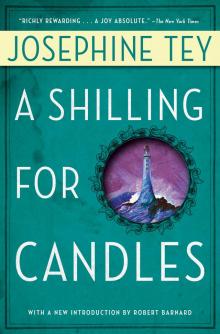 A Shilling for Candles
A Shilling for Candles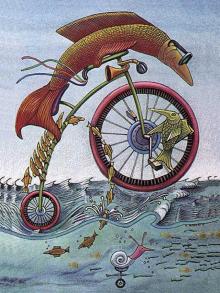 The Singing Sands
The Singing Sands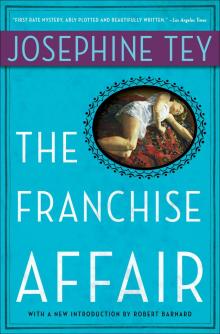 The Franchise Affair
The Franchise Affair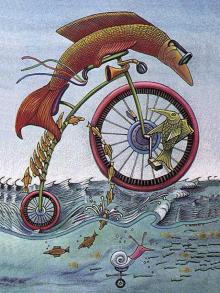 Daughter of Time
Daughter of Time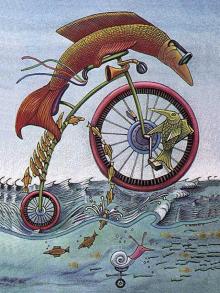 To Love and Be Wise
To Love and Be Wise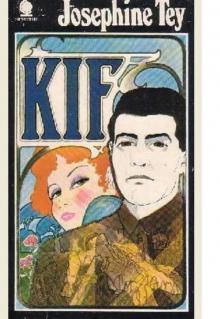 Kif
Kif The Expensive Halo: A Fable Without Moral
The Expensive Halo: A Fable Without Moral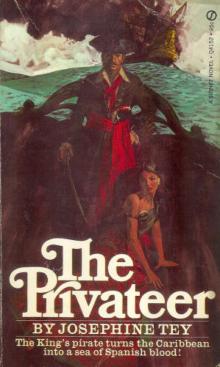 The Privateer
The Privateer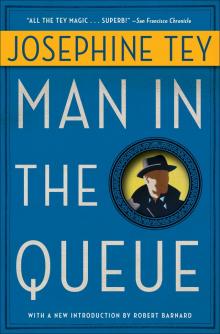 The Man in the Queue
The Man in the Queue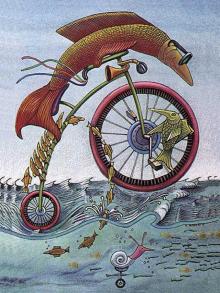 Miss Pym Disposes
Miss Pym Disposes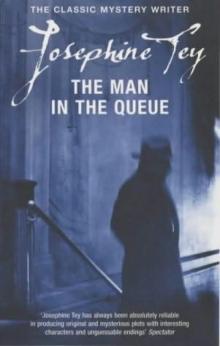 The Man in the Queue ag-1
The Man in the Queue ag-1 Brat Farrar
Brat Farrar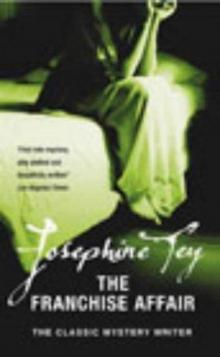 The Franchise Affair ag-3
The Franchise Affair ag-3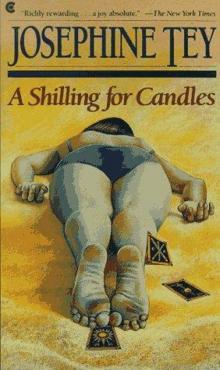 A Shilling for Candles ag-2
A Shilling for Candles ag-2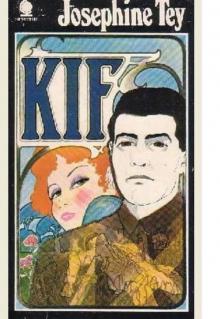 Kif: An Unvarnished History
Kif: An Unvarnished History The Expensive Halo
The Expensive Halo The Singing Sands ag-6
The Singing Sands ag-6 To Love and Be Wise ag-4
To Love and Be Wise ag-4